#By William M'Dowall
Photo
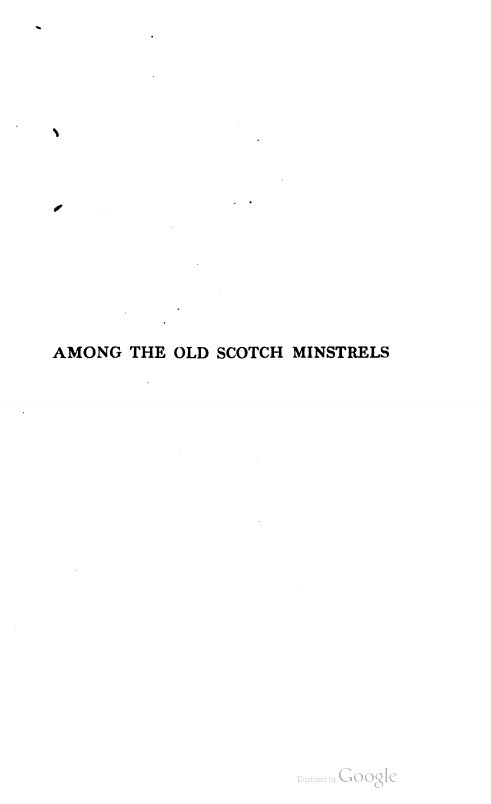
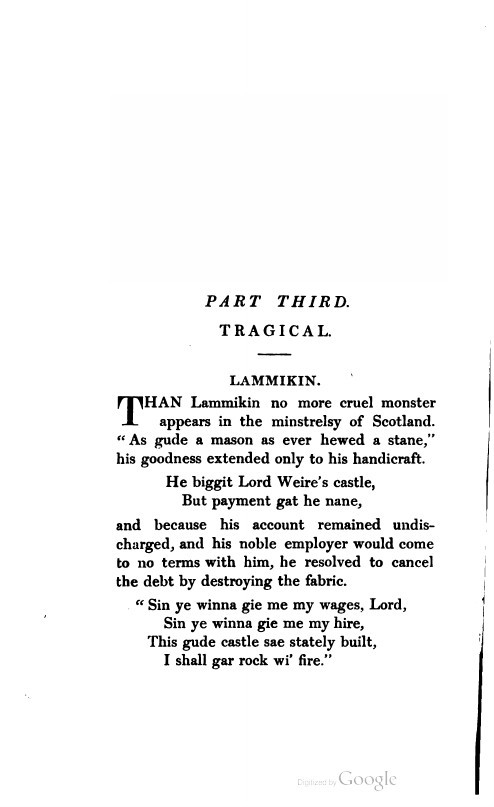
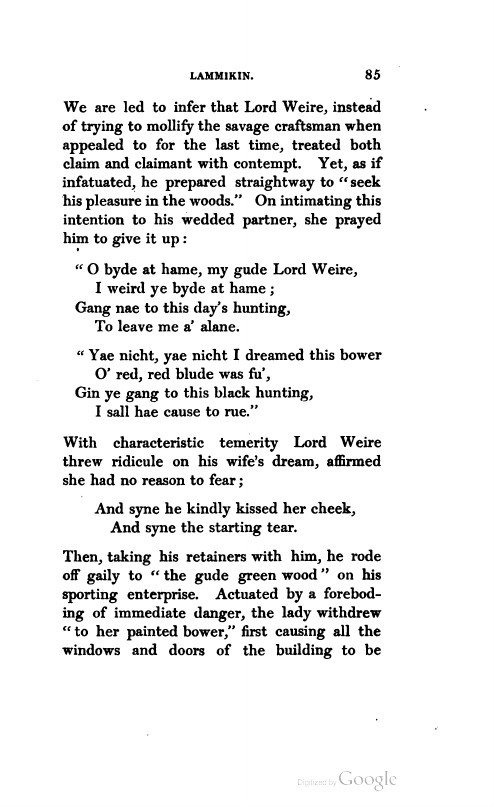
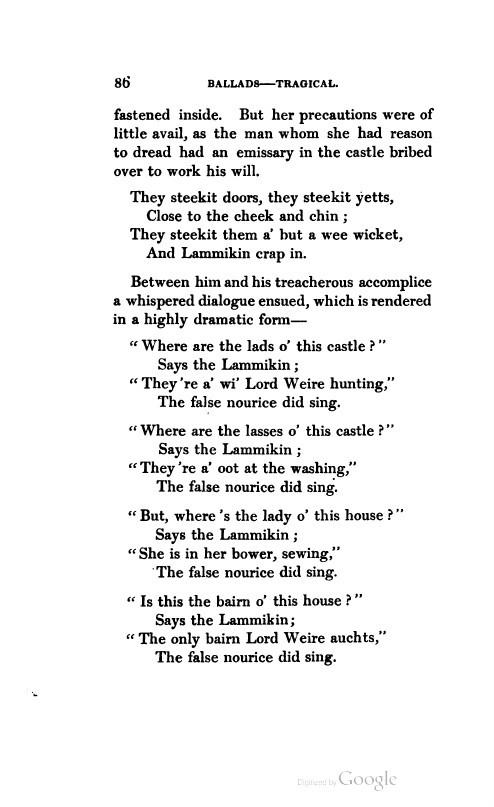
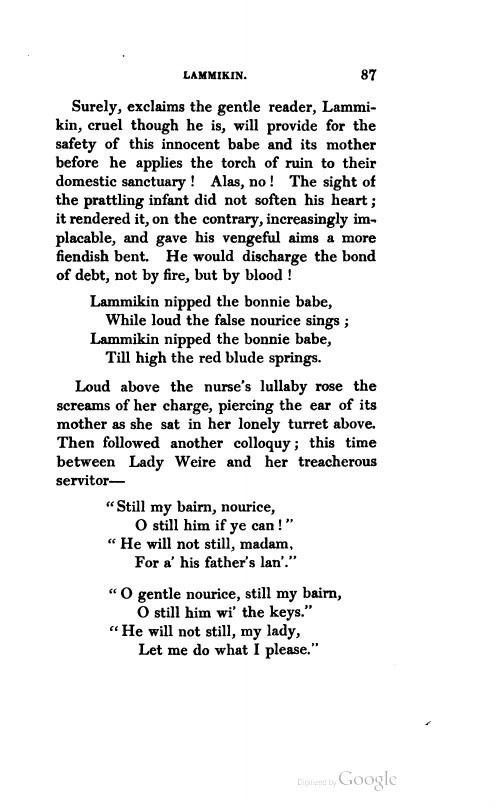
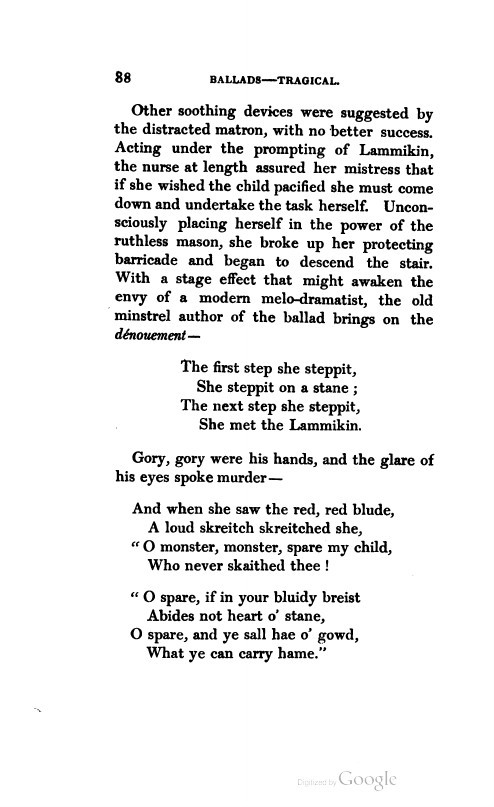
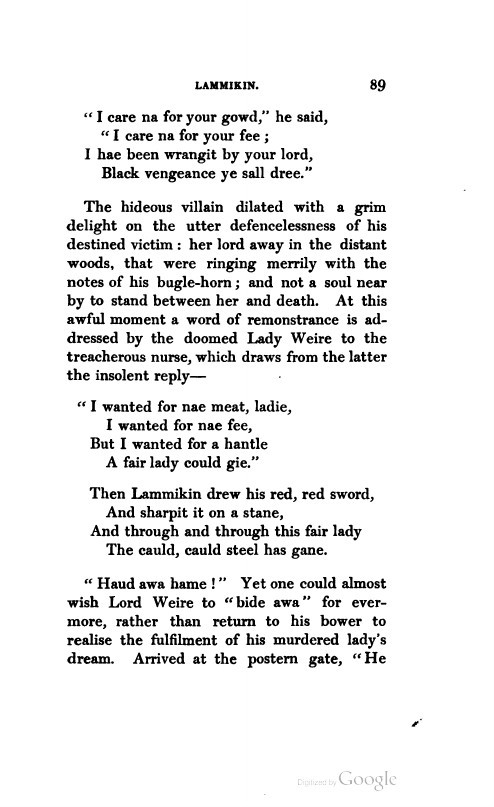

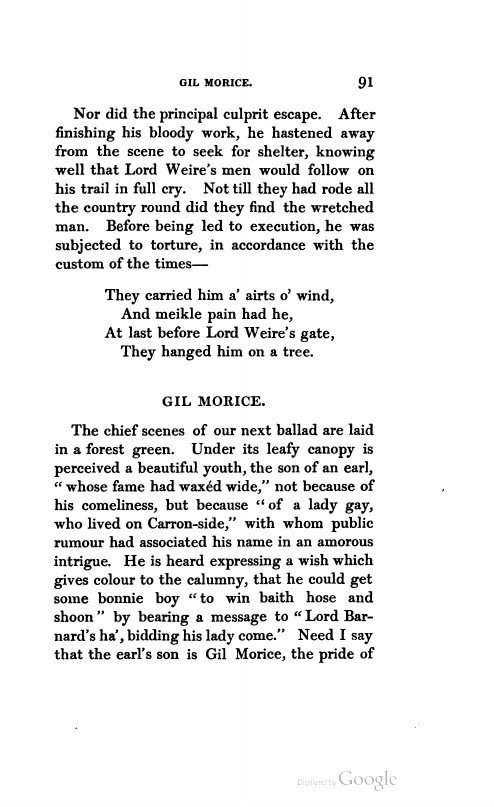
Among the Old Scotch Minstrels
Studying Their Ballads of War Love Social Life Folk-Lore and Fairyland
By William M'Dowall 1888
As always, click pics for full.
EXCERPT
To get the full book: https://books.google.com/books?id=HjFAAAAAYAAJ&
LAMMIKIN.
THAN Lammikin no more cruel monster
appears in the minstrelsy of Scotland.
" As gude a mason as ever hewed a stane,"
his goodness extended only to his handicraft.
He biggit Lord Weire's castle,
But payment gat he nane,
and because his account remained undis
charged, and his noble employer would come
to no terms with him, he resolved to cancel
the debt by destroying the fabric.
It's a bit lengthy so Read More to save your Dash.
" Sin ye winna gie me my wages. Lord,
Sin ye winna gie me my hire,
This gude castle sae stately built,
I shall gar rock wi' fire."
We are led to infer that Lord Weire, instead
of trying to mollify the savage craftsman when
appealed to for the last time, treated both
claim and claimant with contempt. Yet, as if
infatuated, he prepared straightway to "seek
his pleasure in the woods." On intimating this
intention to his wedded partner, she prayed
him to give it up :
" O byde at hame, my gude Lord Weire,
I weird ye byde at hame ;
Gang nae to this day's hunting,
To leave me a' alane.
" Yae nicht, yae nicht I dreamed this bower
O' red, red blude was fu',
Gin ye gang to this black hunting,
I sall hae cause to rue."
With characteristic temerity Lord Weire
threw ridicule on his wife's dream, affirmed
she had no reason to fear ;
And syne he kindly kissed her cheek,
And syne the starting tear.
Then, taking his retainers with him, he rode
off gaily to " the gude green wood " on his
sporting enterprise. Actuated by a forebod
ing of immediate danger, the lady withdrew
" to her painted bower," first causing all the
windows and doors of the building to be
fastened inside. But her precautions were of
little avail, as the man whom she had reason
to dread had an emissary in the castle bribed
over to work his will.
They steekit doors, they steekit yetts,
Close to the cheek and chin ;
They steekit them a' but a wee wicket,
And Lammikin crap in.
Between him and his treacherous accomplice
a whispered dialogue ensued, which is rendered
in a highly dramatic form—
" Where are the lads o' this castle ? "
Says the Lammikin ;
" They 're a' wi' Lord Weire hunting,"
The false nourice did sing.
"Where are the lasses o' this castle ?"
Says the Lammikin ;
" They 're a' oot at the washing,"
The false nourice did sing.
" But, where 's the lady o' this house ? "
Says the Lammikin ;
"She is in her bower, sewing,"
The false nourice did sing.
" Is this the bairn o' this house ? "
Says the Lammikin;
" The only bairn Lord Weire auchts,"
The false nourice did sing.
Surely, exclaims the gentle reader, Lammi
kin, cruel though he is, will provide for the
safety of this innocent babe and its mother
before he applies the torch of ruin to their
domestic sanctuary ! Alas, no ! The sight of
the prattling infant did not soften his heart ;
it rendered it, on the contrary, increasingly im
placable, and gave his vengeful aims a more
fiendish bent. He would discharge the bond
of debt, not by fire, but by blood !
Lammikin nipped the bonnie babe,
While loud the false nourice sings ;
Lammikin nipped the bonnie babe,
Till high the red blude springs.
Loud above the nurse's lullaby rose the
screams of her charge, piercing the ear of its
mother as she sat in her lonely turret above.
Then followed another colloquy; this time
between Lady Weire and her treacherous
servitor—
" Still my bairn, nourice,
O still him if ye can ! "
" He will not still, madam.
For a' his father's Ian'."
" O gentle nourice, still my bairn,
O still him wi' the keys."
" He will not still, my lady,
Let me do what I please."
Other soothing devices were suggested by
the distracted matron, with no better success.
Acting under the prompting of Lammikin,
the nurse at length assured her mistress that
if she wished the child pacified she must come
down and undertake the task herself. Uncon
sciously placing herself in the power of the
ruthless mason, she broke up her protecting
barricade and began to descend the stair.
With a stage effect that might awaken the
envy of a modern melo-dramatist, the old
minstrel author of the ballad brings on the
denouement —
The first step she steppit,
She steppit on a stane ;
The next step she steppit,
She met the Lammikin.
Gory, gory were his hands, and the glare of
his eyes spoke murder —
And when she saw the red, red blude,
A loud skreitch skreitched she,
" O monster, monster, spare my child,
Who never skaithed thee !
" O spare, if in your bluidy breist
Abides not heart o' stane,
O spare, and ye sall hae o' gowd,
What ye can carry hame."
" I care na for your gowd," he said,
" I care na for your fee ;
I hae been wrangit by your lord,
Black vengeance ye sall dree."
The hideous villain dilated with a grim
delight on the utter defencelessness of his
destined victim : her lord away in the distant
woods, that were ringing merrily with the
notes of his bugle-horn ; and not a soul near
by to stand between her and death. At this
awful moment a word of remonstrance is ad
dressed by the doomed Lady Weire to the
treacherous nurse, which draws from the latter
the insolent reply—
" I wanted for nae meat, ladie,
I wanted for nae fee,
But I wanted for a hantle
A fair lady could gie."
Then Lammikin drew his red, red sword,
And sharpit it on a stane,
And through and through this fair lady
The cauld, cauld steel has gane.
" Haud awa hame ! " Yet one could almost
wish Lord Weire to "bide awa" for ever
more, rather than return to his bower to
realise the fulfilment of his murdered lady's
dream. Arrived at the postern gate, "He
thocht he saw his sweet bairn's blude sprinkled
on a stane." His apprehension of evil was
deepened by the rings of his fingers bursting
ominously in twain, and causing him to sigh,
" I wish a' may be weel wi' my lady at hame."
But mair he looked, and dule saw he
On the door at the trance,
Spots o' his dear lady's blude
Shining like a lance.
" Horror on horror's head accumulates," as
he hurries through the chambers of the
castle.
" There 's blude in my nurserie,
There 's blude in my ha',
There's blude in my fair lady's bower,
An' that 's warst o' a'."
Rarely anywhere do we find so much
subject-matter narrated, or rather suggested, in
a single verse, as in the four lines that follow ;
and they are rendered all the more remarkable
by the cheerful accessory which, Hogarthlike,
the painter-poet introduces into his pic
ture, with the view of giving its ghastliness a
deeper shade—
O sweet, sweet sang the birdie,
Upon the bough sae hie,
But little cared false nourice for
Nor did the principal culprit escape. After
finishing his bloody work, he hastened away
from the scene to seek for shelter, knowing
well that Lord Weire's men would follow on
his trail in full cry. Not till they had rode all
the country round did they find the wretched
man. Before being led to execution, he was
subjected to torture, in accordance with the
custom of the times—
They carried him a' airts o' wind,
And meikle pain had he,
At last before Lord Weire's gate,
They hanged him on a tree.
#Lammikin#vampire#Folk Ballad#folklore#Among the Old Scotch Minstrels#Studying Their Ballads of War Love Social Life Folk-Lore and Fairyland#By William M'Dowall#1888#tags preserved for commentary of OP
0 notes